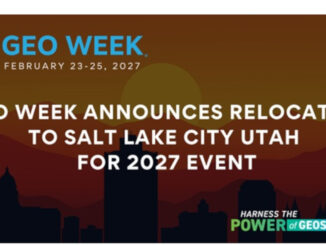
You’ve finished all your courses, walked across the stage wearing a grad gown, cap and hood with your school’s chosen colours, and finished celebrating the completion of a GIS program. Then it hits you. “Now what?”, you think to yourself. You’re fresh out of school with the knowledge of a technology that is used for solving all kinds of spatial problems and monitoring all kinds of processes all around the world. That means that employers should be running up to you with job offers, right? Nope. As with new graduates in any field, you have to make your presence known. And, especially in a slow economy, it won’t happen with a passive approach.
Unfortunately, the current trend that is happening with many different fields is that there is a lag time of several months to even years before people are able to find work that is related to their field after finishing their program. It is certainly becoming a growing challenge. That doesn’t mean that there is anything wrong with your abilities or skills as a recent graduate, just that the market is slow. Tougher times call for tougher strategies for finding work and making yourself known to the right employers.
The approach most people will usually use is searching  for job postings. As a recent graduate, you will have applied to everything that becomes available. In the current job market, however, you soon find out that most of the work available is for someone who has much more experience than you. Often two years, sometimes five or more. The classic job conundrum: the job postings want experienced people, but as a newbie you need a job to gain experience. And then the occasional job postings come up for entry-level work, and you apply. You then realize that you are competing with many other recent graduates just like yourself, perhaps even your classmates, in addition to industry people with experience who will most likely usually get favoured over the rookies.
for job postings. As a recent graduate, you will have applied to everything that becomes available. In the current job market, however, you soon find out that most of the work available is for someone who has much more experience than you. Often two years, sometimes five or more. The classic job conundrum: the job postings want experienced people, but as a newbie you need a job to gain experience. And then the occasional job postings come up for entry-level work, and you apply. You then realize that you are competing with many other recent graduates just like yourself, perhaps even your classmates, in addition to industry people with experience who will most likely usually get favoured over the rookies.
Certainly, some people are able to find jobs right after graduation. Some people get a lucky break with good timing, or immediate connections. Other people are willing to take jobs anywhere, and are willing to move where the work is. That is a smart strategy for finding employment. If you were one of the lucky ones who found a job right away, then you’ve overcome one of the toughest challenges for recent graduates. You’re on the right track. Many people, unfortunately, did not get a lucky break right out of school. For a lot of people, also, relocating is not an option because of family constraints or perhaps personal preference. So now what are you going to do?

For starters, the most important word of advice is to not give up and stay up to date. Even if you have to take another type of job in the meantime, do not stop trying to pursue the GIS job. That’s what you studied for and paid tuition to do, after all. You must also find ways to keep your mind sharp with the skills you just learned. Try downloading trial versions at home, or full copies of software if you can afford it, and use free data from various government or other sites. Give yourself tasks to do, and then try to do them. Volunteering for an organization will also help you achieve this. With a true hands-on skill like welding, you use procedural memory and you are less likely to forget it over time, similar to learning to drive or ride a bike. With GIS, you’re using declarative memory and this kind of memory will fade away if you stop using your skills over longer periods of time. Because GIS is about technology, which is constantly changing, subscribing to GIS newsletters and reading them from time to time also keeps you ‘in the loop’. Attending GIS seminars or presentations will also help in this regard.
The other critical strategy is to try a variety of approaches when seeking GIS work. Job postings for entry-level work represent only a small portion of what’s out there. Most companies do not post entry-level GIS work; usually only larger companies do and only sometimes. With some large companies, you are instructed specifically to make an online profile and post your resume there. That by itself is often not enough, however. Some large companies do not even have a GIS field to select when you are asked to select a general field for which you are applying. What are you to do, then?

The best strategy is to try to get in the minds of the people who do the hiring or make the decisions. The saying that it’s who you know, not what you know, is true. Correspondence by e-mail alone or a job profile online may be overlooked or forgotten. After all, people with higher positions often get a large volume of e-mails every day, and it is easy for them to forget an e-mail of someone they’ve never met. Try to approach companies in industries that use GIS (check their web sites and see what kind of work they do if you’re not sure) and ask to talk to the human resources person or if not, the GIS person. Leave a resume in person, and try to avoid just giving a resume to the front receptionist, to make sure the right person sees it. Some companies will still ask you to make an online job profile or deliver resumes online, but having a physical copy also never hurts.
The next important word of advice is to follow-up regularly. This is especially important if you were unable to give a resume to the right person. Companies get busy with their work and over time, your application will be forgotten if you don’t keep in touch. Also, sometimes if you get back in touch with a company that has said no in the past but with whom you’ve kept in touch, they might have something for you.
 Networking is also critical. Join any GIS-affiliated groups, make personal business cards, and exchange cards. If you have some good contacts, also ask them if they have contacts you can reach. LinkedIn is also very useful in this regard. You never know who might help you to start and later help your career, so having lots of connections and keeping in touch with them is very important not only for getting your first job, but for your entire career. Also, make sure you maintain good terms with your contacts. Most industries consist of many people who know many people, and unprofessional behaviour becomes known very fast.
Networking is also critical. Join any GIS-affiliated groups, make personal business cards, and exchange cards. If you have some good contacts, also ask them if they have contacts you can reach. LinkedIn is also very useful in this regard. You never know who might help you to start and later help your career, so having lots of connections and keeping in touch with them is very important not only for getting your first job, but for your entire career. Also, make sure you maintain good terms with your contacts. Most industries consist of many people who know many people, and unprofessional behaviour becomes known very fast.
Volunteer work is also a way of getting your foot in the door. Ask companies interested in you but maybe unable to hire you at the moment if you can volunteer for them. You will gain valuable experience that will look great on your resume, and maybe they might hire you after seeing your work. If nothing else, you will get some more good contacts and experience with new software that will help you on your path.
Another important word of advice is to look over your resume and cover letter. Make sure it is professional-looking, free from spelling/grammar errors, and gets the right message across about you and your skills. There are many places where you can get help and advice with them, and even your professors from school can help. I was recently given some very good advice to emphasize not things like software and standard GIS skills that most likely all other recent graduates have, but rather things like what you can do using GIS for the company. It is there to help solve problems and increase efficiency of organizations–so let your employers know that you don’t just know the components of a GIS, but what you can do with it that will help them! It’s all about the business in the end, and you are trying to sell your own skills to make them a better business or organization.
Hopefully you might have come across a tip or two that may be useful in the search for your first GIS job. This article is entirely dedicated to my classmates who, like me, are recent graduates and may not have found work in the GIS industry right away. Don’t give up, keep meeting people, keep in touch, and keep on learning. You are the future of the GIS industry.






Be the first to comment